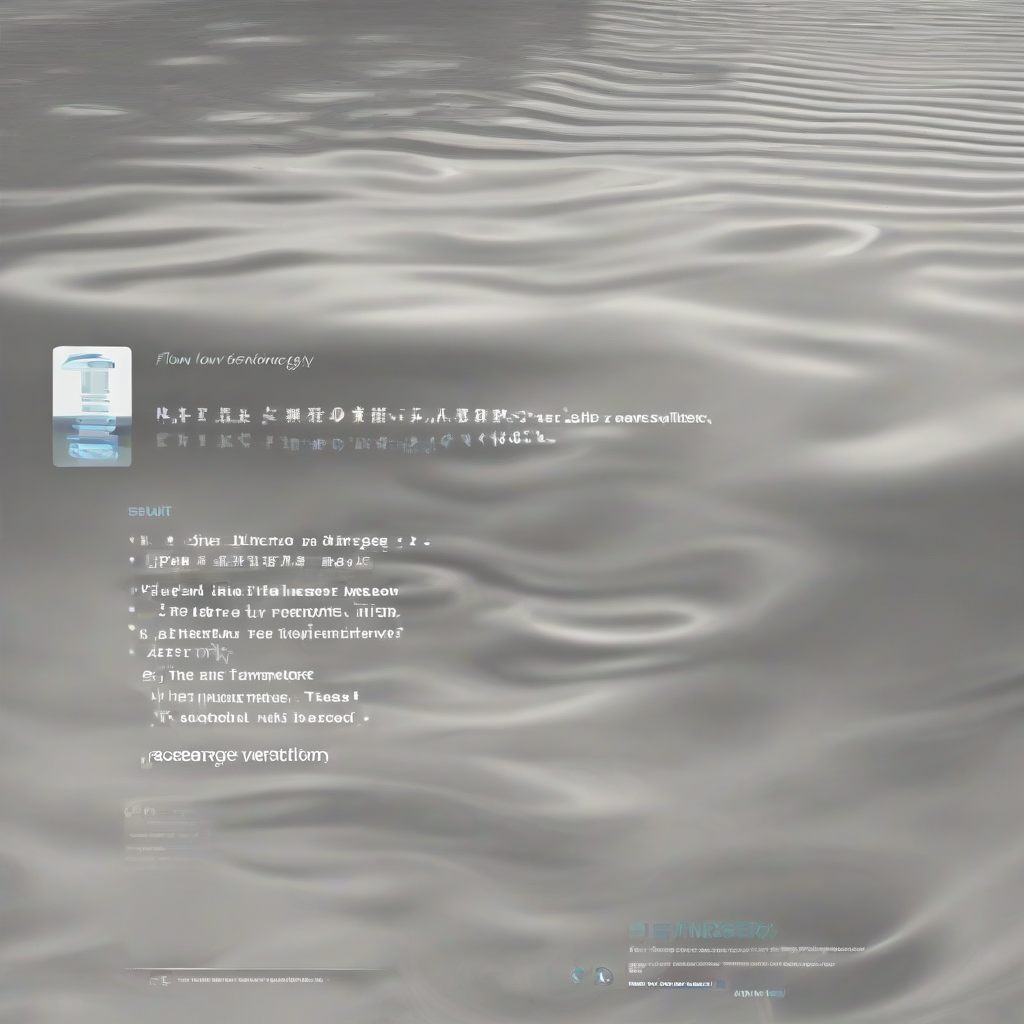Flow Tech Water Treatment: Revolutionizing Water Purification
Flow Tech water treatment represents a significant advancement in water purification technology, leveraging innovative techniques to deliver cleaner, safer, and more sustainable water solutions. This comprehensive exploration delves into the core principles, processes, and applications of Flow Tech, highlighting its potential to address global water challenges.
Understanding Flow Tech’s Core Principles
Flow Tech’s approach to water treatment centers around optimizing fluid dynamics and maximizing efficiency within the purification process. This is achieved through a combination of advanced filtration methods, precise flow control, and intelligent system design. Unlike traditional water treatment plants that often rely on large, energy-intensive processes, Flow Tech prioritizes streamlined operations and reduced environmental impact.
Key Principles:
- Optimized Flow Dynamics: Precise control over water flow ensures uniform treatment across all stages, enhancing efficiency and reducing the risk of clogging or uneven purification.
- Modular Design: Flow Tech systems are often modular, allowing for flexibility in scaling and adaptation to specific water quality needs and site constraints.
- Energy Efficiency: The design incorporates energy-saving technologies, reducing operational costs and minimizing the carbon footprint.
- Automation and Monitoring: Advanced sensors and automation systems enable real-time monitoring and adjustments, optimizing performance and minimizing human intervention.
- Data-Driven Optimization: Continuous data analysis informs process adjustments, leading to ongoing improvements in efficiency and water quality.
Flow Tech Processes and Technologies
Flow Tech employs a range of cutting-edge technologies to achieve superior water purification. These technologies are often tailored to the specific contaminants present in the water source and the desired level of treatment.
Core Technologies Employed:
- Membrane Filtration: Various membrane filtration techniques, including ultrafiltration (UF), nanofiltration (NF), and reverse osmosis (RO), are commonly integrated into Flow Tech systems. These technologies effectively remove suspended solids, dissolved organic matter, bacteria, viruses, and other contaminants.
- Advanced Oxidation Processes (AOPs): AOPs like ozonation and UV disinfection are frequently used to eliminate harmful pathogens and break down persistent organic pollutants. These processes enhance the overall water quality and safety.
- Ion Exchange: This technique is employed to remove specific ions, such as hardness minerals (calcium and magnesium), which can cause scaling and other issues. Ion exchange resins selectively remove unwanted ions while replacing them with more desirable ones.
- Activated Carbon Adsorption: Activated carbon filters effectively remove organic contaminants, such as pesticides, herbicides, and volatile organic compounds (VOCs), through adsorption onto the carbon’s surface.
- Air Stripping: For removing volatile organic compounds, air stripping involves contacting the water with air to transfer the VOCs into the gaseous phase, effectively removing them from the water.
Applications of Flow Tech Water Treatment
The versatility of Flow Tech systems makes them applicable across a broad spectrum of water treatment needs, spanning various industries and sectors.
Key Applications:
- Municipal Water Treatment: Flow Tech systems can be integrated into municipal water treatment plants to improve water quality and reliability, ensuring a safe and consistent supply for communities.
- Industrial Water Treatment: Industries with stringent water quality requirements, such as pharmaceuticals, electronics, and food processing, rely on Flow Tech solutions to meet their specific needs.
- Wastewater Treatment: Flow Tech technology contributes to effective wastewater treatment, removing pollutants and ensuring compliance with environmental regulations.
- Desalination: Flow Tech plays a role in enhancing desalination processes, improving efficiency and reducing energy consumption while providing access to potable water in water-scarce regions.
- Water Reuse and Recycling: Flow Tech’s advanced purification capabilities support water reuse and recycling initiatives, conserving valuable water resources and reducing the overall water footprint.
Advantages of Flow Tech Water Treatment
Flow Tech water treatment offers numerous advantages compared to traditional methods, leading to significant improvements in water quality, efficiency, and sustainability.
Key Advantages:
- Improved Water Quality: Flow Tech systems deliver consistently high-quality water, exceeding many regulatory standards and providing enhanced safety and purity.
- Enhanced Efficiency: Optimized flow dynamics and streamlined processes lead to greater efficiency, reducing energy consumption and operational costs.
- Reduced Environmental Impact: The reduced energy use and smaller footprint contribute to a smaller carbon footprint and minimize the environmental impact of water treatment.
- Flexibility and Scalability: Modular designs allow for easy customization and adaptation to different site conditions and water quality challenges.
- Improved Reliability: Automated monitoring and control systems ensure consistent performance and minimize downtime.
- Reduced Chemical Usage: In many cases, Flow Tech systems reduce or eliminate the need for harsh chemicals, promoting environmental sustainability and operator safety.
Challenges and Future Directions of Flow Tech
While Flow Tech presents significant advantages, some challenges remain to be addressed to further enhance its impact and accessibility.
Challenges and Future Directions:
- Cost of Implementation: The initial investment in Flow Tech systems can be higher than traditional methods, although long-term operational savings often offset this initial cost.
- Technological Advancements: Continuous research and development are essential to refine existing technologies and explore new approaches to improve efficiency and address emerging contaminants.
- Integration with Existing Infrastructure: Integrating Flow Tech into existing water treatment facilities can require careful planning and adaptation.
- Membrane Fouling: Membrane fouling remains a challenge in membrane filtration processes, requiring effective cleaning and maintenance strategies.
- Sustainable Material Selection: Utilizing more sustainable and recyclable materials in the construction of Flow Tech systems is crucial for environmental sustainability.
- Data Analytics and Artificial Intelligence: Integrating advanced data analytics and AI can further optimize system performance and predict maintenance needs.
In conclusion, Flow Tech water treatment represents a significant leap forward in water purification technology. Its focus on optimized flow dynamics, advanced processes, and sustainable practices offers solutions to pressing global water challenges. Continued research and development, coupled with strategic implementation, will be instrumental in unlocking the full potential of Flow Tech and securing clean, safe water for generations to come.

